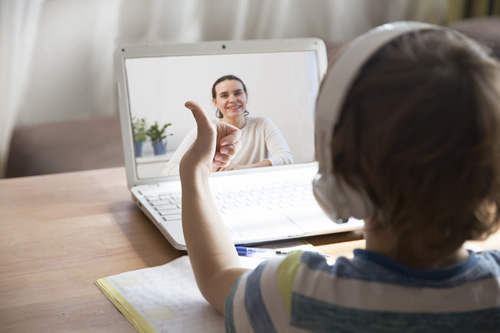Distance learning has become a new reality for many learning institutions across the country. Moving a brick-and-mortar curriculum online overnight is no easy task. Many districts that lacked distance learning plans, communication tools, and training for teachers found the rapid change from the classroom to distance learning a bit too challenging. Some even shut down the school year early.
However, at Marshall Public Schools, a rural district serving approximately 2,500 students, we were fortunate enough to have a few plans in place should the need for distance learning arise.
Related content: 4 steps to deliver distance learning effectively
When the pandemic hit, we knew that schools’ potential to close was coming, and we began preparing for distance learning in mid-March. In the mere eight days provided by our state government, we were able to flip our traditional classroom environment to an online environment and immediately communicate that plan with parents.
Today we maintain continuous learning through various tech tools and the lessons we learned from this speedy transition.
Establishing a communications hub
Our distance learning program launched rapidly because it had to. It was a team effort by everyone in the district. We only had eight days to roll everything out and to communicate with parents. Because we’re a Microsoft school, we use Outlook email with our students, but when we moved online we used the Bloomz app as our primary resource for distance learning and ongoing communication with our West Side students and families.
As our teachers were already trained to use it, implementation was pretty straightforward. Whenever we have a new on-boarding teacher, they will receive a mentor teacher who takes the lead getting that new teacher started with the app.
Since adopting the app, we’ve always had parents sign up for accounts for everyday communication, but we’d never established student accounts. When we moved into distance learning, though, we felt it would be very advantageous to create them as they would provide a way to manage classwork and student progress online.
Because we’re a full 1-to-1 district, all of our students have a device at home, so we could use those devices to facilitate communication with families and provide continuous learning opportunities for our students. By using a platform that was familiar to parents and making devices available to students, we made a complete transition to an online framework rather seamlessly.
Staying connected in a variety of ways
When it was time to relay our strategy with parents, we consolidated a lot of information to just one channel because we knew that would reach most of the families and help eliminate confusion, and once everyone was comfortable with the new normal and knew what was going on, we began limiting our communication to metered updates, again to reduce noise; Sometimes more is less.
In our online learning model, our teachers use Microsoft Teams for live meeting scenarios with their students and students are using a couple of digital tools to submit work. One nice thing about Bloomz is that because it’s an app, it can operate on a parent’s device using cell data. When Wi-Fi isn’t available, parents can take pictures of their kids’ assignments and upload them for teachers to review.
Our teachers can show parents the homework assignments, too, after they’ve graded them and are adamant about staying in touch with families with weekly class announcements. We communicate daily with our students and make ourselves available to connect with parents at any time with two-way board messaging.
Looking to the future
Plans for summer school and next fall will be coming down from our administration soon. No matter if our instruction is in-person, online, or blended, we are confident in our staff who make every effort to ensure they’re contacting every one of their students on a regular basis, whether that be through a phone call, Bloomz, an email or a Microsoft Teams meeting. They are going above and beyond to make sure that we are staying in continuous contact with these students and accelerating their learning no matter the environment.
The experience of the past few months has really strengthened the relationship between the parents and the school— just the recognition of how difficult this whole process is for the students, for the families, for the staff, and the teachers. It’s been a very cooperative effort, and has been a very positive one for us in our district.
- 5 digital resources to inspire curiosity and engage students - April 30, 2024
- Critical steps to help school districts combat ransomware attacks - April 30, 2024
- Empowering girls with STEM education to build tomorrow’s tech industry - April 29, 2024

